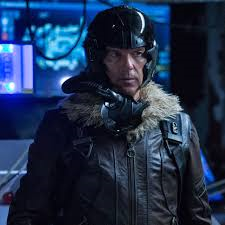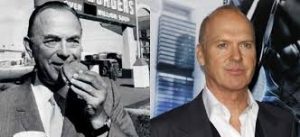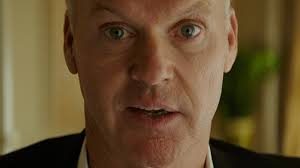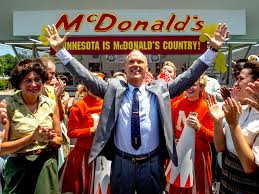AUDIO PODCAST OPTION OF THE FOUNDER REVIEW
SHORT TAKE:
Dry and uninvolving biopic, despite Michael Keaton’s efforts, about Ray Kroc, the avaricious business predator, who co-opted then outsted the McDonald brothers from their own creation.
WHO SHOULD WATCH:
Limited to adults and older teens only because some language and Kroc’s lack of interpersonal and business ethics. The mechaniations of enterprise – good and bad – might be interesting to business and history students.
AND IF YOU LIKE THESE REVIEWS PLEASE SUBSCRIBE! THEN YOU’LL GET EVERY NEW REVIEW SENT STRAIGHT TO YOUR E-MAIL!!
GO TO THE BOTTOM OF THE LEFT HAND SIDE AND TYPE YOUR E-MAIL IN – IT (SHOULD BE) THAT EASY. ANY PROBLEMS PLEASE SEND ME A COMMENT AND I’LL DO MY BEST TO RESOLVE YOUR ISSUE.
LONG TAKE:
If you can not be a good example be a horrible warning. I’m not sure which one the makers of The Founder intended it to be.
The Founder is a 2016 biopic about Ray Kroc, the man who made McDonald’s a multi-bazillion dollar enterprise and its distinct 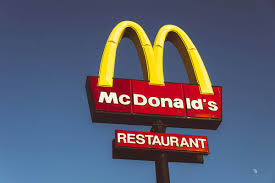 Golden Arches logo one of the most recognizable symbols on (literally) the entire planet.
Golden Arches logo one of the most recognizable symbols on (literally) the entire planet.



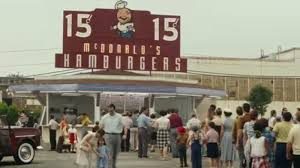 McDonald’s was a singular hamburger restaurant – one of, if not the first, walk-up, designed by the McDonald brothers,
McDonald’s was a singular hamburger restaurant – one of, if not the first, walk-up, designed by the McDonald brothers, 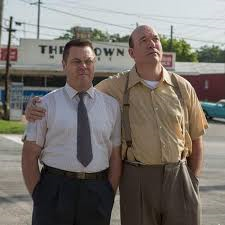 Maurice and Richard (John Carroll Lynch of Jackie – see my review of Jackie here – and Nick Offerman from Parks and Recreation). Their’s was a unique concept, carefully designed and laid out, innovative and revoluitionary in the Drive-In-car hop-predominated culture of America in the 1950’s.
Maurice and Richard (John Carroll Lynch of Jackie – see my review of Jackie here – and Nick Offerman from Parks and Recreation). Their’s was a unique concept, carefully designed and laid out, innovative and revoluitionary in the Drive-In-car hop-predominated culture of America in the 1950’s.  Richard and Maurice, had created this style as a money saver – no car hops, broken glassware, or dallying hoodlums. People stood in line to get great tasting burgers, in throw away packaging, in a clean family friendly environment.
Richard and Maurice, had created this style as a money saver – no car hops, broken glassware, or dallying hoodlums. People stood in line to get great tasting burgers, in throw away packaging, in a clean family friendly environment. 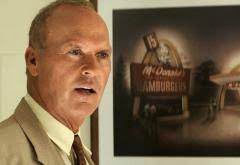 What the McDonald brothers saw as the fulfillment of a lifelong dream, Ray Kroc saw as a golden goose just waiting to be plucked.
What the McDonald brothers saw as the fulfillment of a lifelong dream, Ray Kroc saw as a golden goose just waiting to be plucked.
SPOILERS
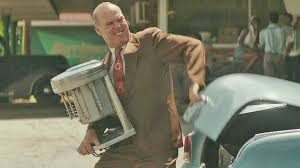 The film starts with Ray as an unsuccessful multi-spindle milkshake salesman who happens upon this singular successful enterprise and recognizes the brilliant business model for what it is. The McDonald brothers think “small” but Ray believes in BIG.
The film starts with Ray as an unsuccessful multi-spindle milkshake salesman who happens upon this singular successful enterprise and recognizes the brilliant business model for what it is. The McDonald brothers think “small” but Ray believes in BIG.  And the McDonald brothers don’t know to whom they are linking their futures when they sign a contract with Ray to establish franchises. Ray’s personal motto is “Persistence” and he uses his formidable variation on it to: slowly negotiate, maneuver and leverage their business right out from under them, steal the wife of one of his franchise partners, leave his own wife, and cheat the McDonald brothers out of the royalty fees to which they were promised when they inevitably are forced to sell out to Ray.
And the McDonald brothers don’t know to whom they are linking their futures when they sign a contract with Ray to establish franchises. Ray’s personal motto is “Persistence” and he uses his formidable variation on it to: slowly negotiate, maneuver and leverage their business right out from under them, steal the wife of one of his franchise partners, leave his own wife, and cheat the McDonald brothers out of the royalty fees to which they were promised when they inevitably are forced to sell out to Ray.
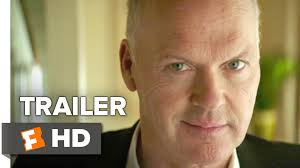 This is NOT a nice man, but then neither was
This is NOT a nice man, but then neither was 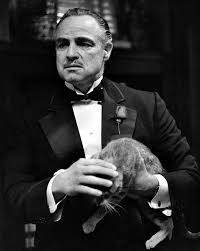 Vito Corleone in The Godfather Trilogy or
Vito Corleone in The Godfather Trilogy or 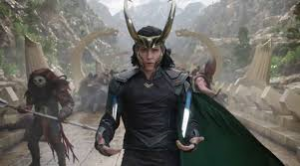 Loki from The Avengers movies. And people generally love both the
Loki from The Avengers movies. And people generally love both the 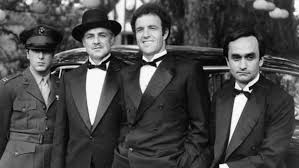 Corleone patriarch and
Corleone patriarch and 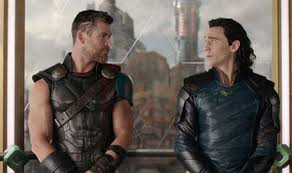 Thor’s sly brother as guilty pleasures. But what the latter two had in abundance, Ray Kroc, as portrayed in The Founder, had none of – and that was a relatable personality.
Thor’s sly brother as guilty pleasures. But what the latter two had in abundance, Ray Kroc, as portrayed in The Founder, had none of – and that was a relatable personality.
 The Founder plays out like the dramatically filmed version of a documentary. It is not filmed in documentary style but is written as a series of facts filmed in vignettes. The movie is seen through Ray Kroc’s eyes in a terrific performance by Michael Keaton but only in the visual sense.
The Founder plays out like the dramatically filmed version of a documentary. It is not filmed in documentary style but is written as a series of facts filmed in vignettes. The movie is seen through Ray Kroc’s eyes in a terrific performance by Michael Keaton but only in the visual sense. 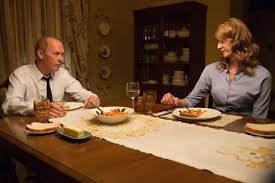 By that I mean, we see what happens as Kroc himself might remember them but we, the audience, get no real feel for seeing AS Kroc might have seen life. We are never given opportunity to see the world as Ray Kroc sees it. We only hear him voice the sentiments of his own avarice without understanding what it was that drove him to HAVE those views. No back story, no moments of reflection, no knowing how he reconciles with or justifies to himself what he has done to others.
By that I mean, we see what happens as Kroc himself might remember them but we, the audience, get no real feel for seeing AS Kroc might have seen life. We are never given opportunity to see the world as Ray Kroc sees it. We only hear him voice the sentiments of his own avarice without understanding what it was that drove him to HAVE those views. No back story, no moments of reflection, no knowing how he reconciles with or justifies to himself what he has done to others. 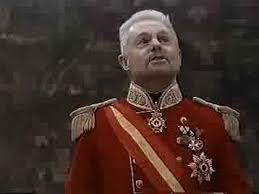 Certainly, no King Claudius self-tormenting moments from Hamlet, wherein the character knows the wrong he has done and would like to repent but is unable because of his own weaknesses for the things he has acquired through those same outrageous acts.
Certainly, no King Claudius self-tormenting moments from Hamlet, wherein the character knows the wrong he has done and would like to repent but is unable because of his own weaknesses for the things he has acquired through those same outrageous acts.
Keaton has been 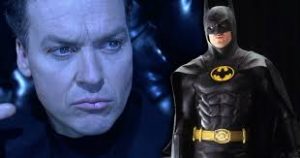 Batman,
Batman, 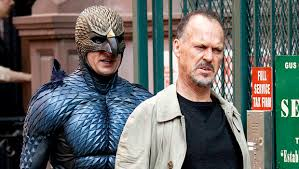 Bird Man,
Bird Man, 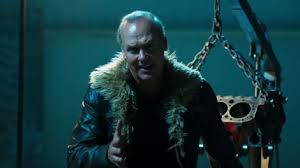 Vulture in Spiderman Homecoming, and
Vulture in Spiderman Homecoming, and 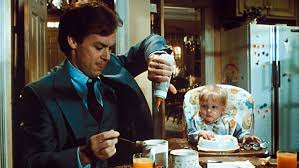 Mr. Mom – all variations on super heroes with a dark but redemptively inclined streak in one form or another (even his character in the comedy Mr Mom gets within a hair’s breadth of the dark action of cheating on his wife but comes to his senses in the nick of time). So playing an appealing villain would not be his first rodeo.
Mr. Mom – all variations on super heroes with a dark but redemptively inclined streak in one form or another (even his character in the comedy Mr Mom gets within a hair’s breadth of the dark action of cheating on his wife but comes to his senses in the nick of time). So playing an appealing villain would not be his first rodeo. 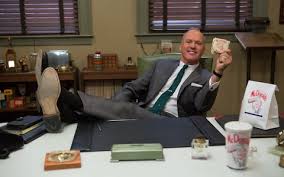 Unfortunately, the script gives him little to do but posture and go through the motions. Once he establishes his unsuccessful frustrated character then woos the McDonald brothers, the rest of the movie is merely a checklist of events. Expand the business – check. Buy land – check. Meet his business associate’s wife and show interest – check.
Unfortunately, the script gives him little to do but posture and go through the motions. Once he establishes his unsuccessful frustrated character then woos the McDonald brothers, the rest of the movie is merely a checklist of events. Expand the business – check. Buy land – check. Meet his business associate’s wife and show interest – check. 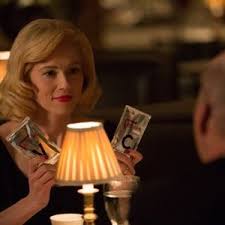 Use innovations, like dried instant milkshake without the McDonald brothers permission – check.
Use innovations, like dried instant milkshake without the McDonald brothers permission – check.  Tell the brothers he has more money and so he can do what he wants and they are out – check. Movie over – check.
Tell the brothers he has more money and so he can do what he wants and they are out – check. Movie over – check.
Don’t get me wrong. Keaton does his best with this dry script. He even manages a few moments which gives a glimmer of what the movie should have been. For example, 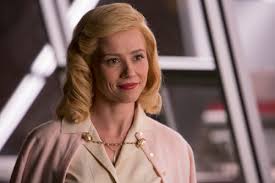 there’s one scene where he joins his future second wife, Joan (Linda Cardellini from Daddy’s Home and Avengers: Age of Ultron) at a piano where she works and, right in front of her husband, manages to woo her by singing with her. And the first scenes which show his woeful attempts to sell his multi-mixers demonstrate his gift of gab which is falling on deaf ears. I mean, his pitch was so good I was almost ready to buy one! But, alas, his potential buyers were noT so convinced. So you come to understand why, when he sees this extremely profitable “hamburger joint” his mouth starts watering and not just for the French fries. But for every one of the few interesting scenes there are several astonishingly bland ones, such as when he announces, as they eat a silent dinner at their kitchen table, to his all but ignored wife, Ethel, (Laura “Jurassic Park” Dern), that he wants a divorce.
there’s one scene where he joins his future second wife, Joan (Linda Cardellini from Daddy’s Home and Avengers: Age of Ultron) at a piano where she works and, right in front of her husband, manages to woo her by singing with her. And the first scenes which show his woeful attempts to sell his multi-mixers demonstrate his gift of gab which is falling on deaf ears. I mean, his pitch was so good I was almost ready to buy one! But, alas, his potential buyers were noT so convinced. So you come to understand why, when he sees this extremely profitable “hamburger joint” his mouth starts watering and not just for the French fries. But for every one of the few interesting scenes there are several astonishingly bland ones, such as when he announces, as they eat a silent dinner at their kitchen table, to his all but ignored wife, Ethel, (Laura “Jurassic Park” Dern), that he wants a divorce. 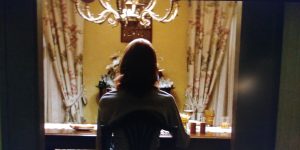 She just puts down her fork, the camera pans back and away from her, the end. (Huh?) The audience pretty much knew this was coming, but instead of
She just puts down her fork, the camera pans back and away from her, the end. (Huh?) The audience pretty much knew this was coming, but instead of 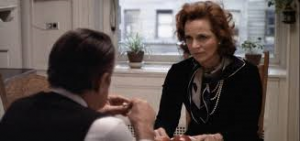 Beatrice Straight’s Oscar winning 5 minutes in Network where she reads her husband the riot act for walking out on her, we get something more akin to the emotional vacuum of
Beatrice Straight’s Oscar winning 5 minutes in Network where she reads her husband the riot act for walking out on her, we get something more akin to the emotional vacuum of 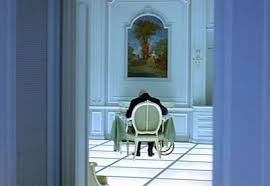 Dave as he eats alone in the empty house in 2001.
Dave as he eats alone in the empty house in 2001.
This is a humorless look at the man. Kroc states as his personal philosophy to the McDonald brothers at one point – “If my competitor was drowning I’d stick a hose in his mouth.” So “business is business” is obviously a manifesto with Kroc. But that does not mean this arid POV has to be reflected in the way the movie is written. I can’t help but wonder how much better this movie would have been with a 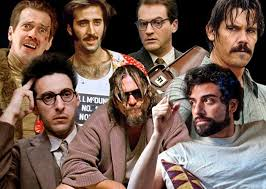 Cohen Brothers-style hero in the lead.
Cohen Brothers-style hero in the lead.
In short, this is a flat film whose basic moral could be stated as: “If you are persistent enough you can have everything you want and never have to suffer the consequences of your evil actions.” Kroc stole his partners’ business, his friend’s wife, and cheated the McDonald brothers out of hundreds of millions of dollars of royalties —- because he could. But we ultimately don’t care. We don’t know the abused well enough to empathize and we are givennothing with which to relate to the main character. It’s an unpalatable story which wastes the considerable talents of Keaton.
So……….next time, Keaton wants to play a vulture, I’d much rather it be one in a Spiderman sequel. 